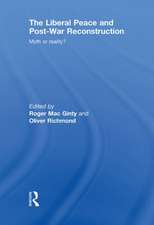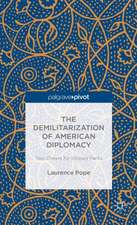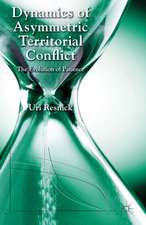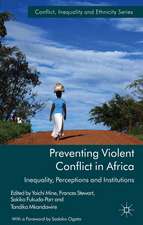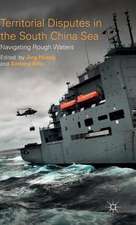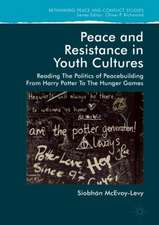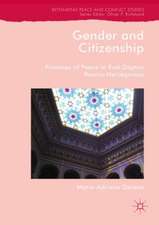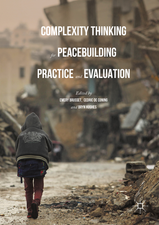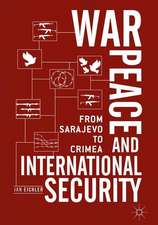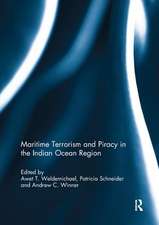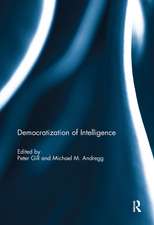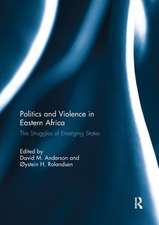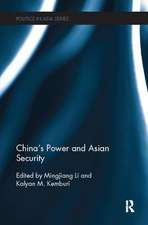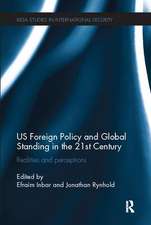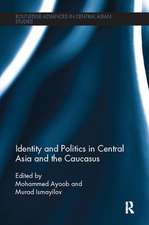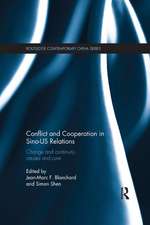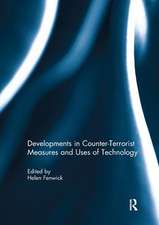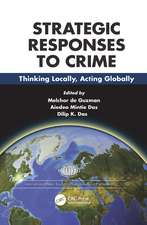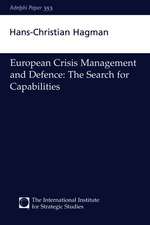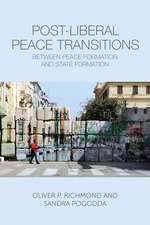The Palgrave Handbook of Disciplinary and Regional Approaches to Peace
Editat de Oliver Richmond, Sandra Pogodda, Jasmin Ramovicen Limba Engleză Paperback – 31 aug 2016
| Toate formatele și edițiile | Preț | Express |
|---|---|---|
| Paperback (1) | 1394.03 lei 43-57 zile | |
| Palgrave Macmillan UK – 31 aug 2016 | 1394.03 lei 43-57 zile | |
| Hardback (1) | 1400.35 lei 43-57 zile | |
| Palgrave Macmillan UK – 18 feb 2016 | 1400.35 lei 43-57 zile |
Preț: 1394.03 lei
Preț vechi: 1700.03 lei
-18% Nou
Puncte Express: 2091
Preț estimativ în valută:
266.83€ • 289.94$ • 224.28£
266.83€ • 289.94$ • 224.28£
Carte tipărită la comandă
Livrare economică 21 aprilie-05 mai
Preluare comenzi: 021 569.72.76
Specificații
ISBN-13: 9781137407603
ISBN-10: 1137407603
Pagini: 528
Dimensiuni: 155 x 235 x 45 mm
Greutate: 0.82 kg
Ediția:1st ed. 2016
Editura: Palgrave Macmillan UK
Colecția Palgrave Macmillan
Locul publicării:London, United Kingdom
ISBN-10: 1137407603
Pagini: 528
Dimensiuni: 155 x 235 x 45 mm
Greutate: 0.82 kg
Ediția:1st ed. 2016
Editura: Palgrave Macmillan UK
Colecția Palgrave Macmillan
Locul publicării:London, United Kingdom
Cuprins
PART I: DISCIPLINARY PERSPECTIVES 1. History Peace in History; John Gittings 2. Politics and Governance: From Emergency to Emergence ; David Chandler 3. Philosophy: The Philosophy of Peace; Nick Rengger 4. International Relations: Peace in International Relations Theory; Oliver P. Richmond 5. Anthropology: Implications for Peace; Geneviève Souillac and Douglas P. Fry 6. Arts and Theatre for Peacebuilding; Nilanjana Premaratna and Roland Bleiker 7. Sociology: A Sociological Critique of Liberal Peace; Nicos Trimikliniotis 8. Economics: Neoliberal Peace and the Politics of Social Economics; Brendan Murtagh 9. Geography: Geography and Peace; Nick Megoran, Fiona McConnell and Phillipa Williams 10. Development: Peace and Development Studies; Caroline Hughes 11. Postcolonialism: A Postcolonial Perspective on Peacebuilding; Vivienne Jabri 12. Religion: Peace through Non-Violence in Four Religious Traditions; Caron Gentry 13. Gender: The Missing Piece in the Peace Puzzle; Annika Bjorkdahl and Johanna M. Selimovic 14. Education: Cultural Reproduction, Revolution and Peacebuilding in Conflict-affected Societies; Tejendra Pherali 15. Children: Children and Peace; Ben Collins and Alison Watson 16. Social Psychology: Social Psychology and Peace; Shelley McKeown and Daniel Christie 17. Humanitarianism: Humanitarianism and Peace; Jenny H. Peterson 18. International Law: To End the Scourge of War and to Build a Just Peace?; Wendy Lambourne 19. Indigeneity and Peace; Morgan Brigg and Polly O. Walker 20. Critical Security Studies: Alternative Dialogues for Peace - Reconstructing 'Language Barriers' and 'Talking Points'; Faye Donnelly PART II: REGIONAL PERSPECTIVES 21. South Africa's Incomplete Peace; Andries Odendaal 22. West Africa: Peace in West Africa; Patrick Tom 23. The Great Lakes Region of Africa; Local Perspectives on Liberal Peacebuilding from the Democratic Republic of Congo ; Josaphat M. Bussy and Carol Gallo 24. The Horn of Africa: Peace in the Horn of Africa; Christopher Clapham 25. Southeast Asia: Peace through Retribution or Reconciliation? Some Insights and Evidence from Southeast Asia; Sorpong Peou 26. East Asia: Understanding the Broken Harmony in Confucian Asia; Ching-Chang Chen 27. South Asia: Human Development and Minority Empowerment Exploring Regional Perspectives on Peace in South Asia; Florian Krampe and Ashok Swain 28. Emerging Countries: Peace and the Emerging Countries; Kai Michael Kenkel 29. Central Asia Central Asia: Contested Peace; David Lewis 30. Middle East and North Africa: Hegemonic Modes of Pacification in Crisis; Sandra Pogodda 31. Europe: Peace in Europe; Roberto Belloni 32. Balkans; Jasmin Ramovic 33. South America; Peacebuilding in South America: Roddy Brett and Diana Florez 34. Central America: From War to Violence; Jenny Pearce 35. North America: Peace Studies versus the Hegemony of Realist and Liberal Methods; Henry F. Carey 36. Pacific: Peace in the Pacific Grounded in Local Custom, Adapting to Change; Volker Boege
Notă biografică
Roberto Belloni, University of Trento, ItalyAnnika Björkdahl, Lund University, SwedenRoland Bleiker, University of Queensland, Australia Volker Boege, University of Queensland, AustraliaRoddy Brett, University of St Andrews, UKMorgan Brigg, University of Queensland, Australia Josaphat Musamba Bussy, Free University of the Great Lakes, Democratic Republic of CongoHenry F. (Chip) Carey, Georgia State University, USADavid Chandler, University of Westminster, UKChing-Chang Chen Ryukoku University, JapanDaniel Christie, Ohio State University, USAChristopher Clapham, Cambridge University, UKBennett Collins, University of St Andrews, UK Faye Donnelly, University of St Andrews, UKDiana Florez, United Nations Development Programme, ColombiaDouglas P. Fry, University of Alabama,USACarol Jean Gallo, Cambridge University, UK Caron E. Gentry, University of St Andrews, UK John Gittings, School of Oriental and African Studies, UKCaroline HughesUniversity of Bradford, UKVivienne Jabri, King's College London, UKKai Michael Kenkel, Pontifical Catholic University, Brazil Florian Krampe, Uppsala University, SwedenWendy Lambourne, University of Sydney, Australia David Lewis University of Exeter, UKJohanna Mannergren Selimovic, Swedish Institute of International Affairs, SwedenFiona McConnell, University of Oxford, UK Shelley McKeown, University of Bristol, UKNick Megoran, Newcastle University, UKBrendan Murtagh, Queens University Belfast, UKAndries Odendaal, University of Pretoria, South AfricaJenny Pearce, University of Bradford, UKSorpong Peou, Ryerson University, CanadaJenny H. Peterson, University of British Columbia, CanadaTejendra Pherali, University College London, UK Nilanjana Premaratna, University of Queensland, AustraliaNicholas Rengger, University of St Andrews, UK Geneviève Souillac, Katholieke Universiteit Leuven, BelgiumAshok Swain, Uppsala University, SwedenPatrick Tom, Mindleag Limited, UKNicos Trimikliniotis, University of Nicosia, CyprusPolly O. Walker, Juniata College, USAAlison Watson, University of St Andrews, UKPhilippa Williams, Queen Mary University London, UK
Textul de pe ultima copertă
In this handbook, a diverse range of leadingscholars consider the social, cultural, economic, political, and developmentalunderpinnings of peace. This handbook is a much-needed response to the failuresof contemporary peacebuilding missions and narrow disciplinary debates, both ofwhich have outlined the need for more interdisciplinary work in International Relationsand Peace and Conflict studies. Scholars, students, and policymakers are oftendisillusioned with universalist and northern-dominated approaches, and a betterunderstanding of the variations of peace and its building blocks, acrossdifferent regions, is required. Collectively, these chapters promote a moredifferentiated notion of peace, employing comparative analysis to explain howpeace is debated and contested.
Descriere
Descriere de la o altă ediție sau format:
In this handbook, a diverse range of leadingscholars consider the social, cultural, economic, political, and developmentalunderpinnings of peace. This handbook is a much-needed response to the failuresof contemporary peacebuilding missions and narrow disciplinary debates, both ofwhich have outlined the need for more interdisciplinary work in International Relationsand Peace and Conflict studies. Scholars, students, and policymakers are oftendisillusioned with universalist and northern-dominated approaches, and a betterunderstanding of the variations of peace and its building blocks, acrossdifferent regions, is required. Collectively, these chapters promote a moredifferentiated notion of peace, employing comparative analysis to explain howpeace is debated and contested.
In this handbook, a diverse range of leadingscholars consider the social, cultural, economic, political, and developmentalunderpinnings of peace. This handbook is a much-needed response to the failuresof contemporary peacebuilding missions and narrow disciplinary debates, both ofwhich have outlined the need for more interdisciplinary work in International Relationsand Peace and Conflict studies. Scholars, students, and policymakers are oftendisillusioned with universalist and northern-dominated approaches, and a betterunderstanding of the variations of peace and its building blocks, acrossdifferent regions, is required. Collectively, these chapters promote a moredifferentiated notion of peace, employing comparative analysis to explain howpeace is debated and contested.


